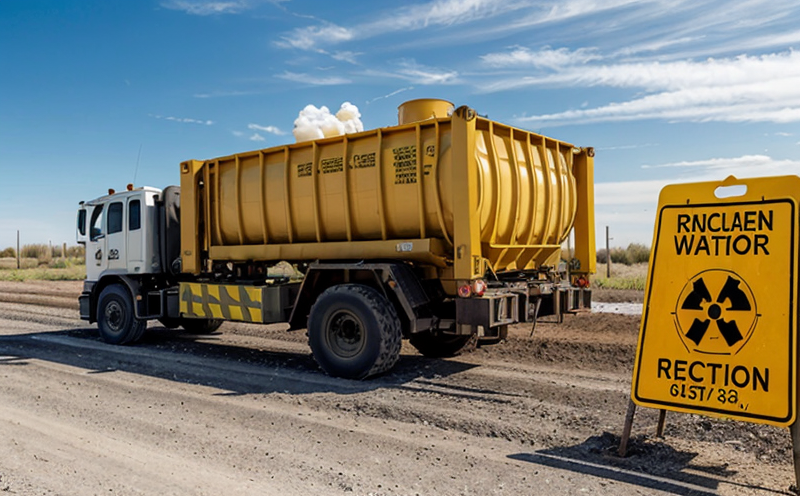IAEA SSG-23 The Safety Case and Safety Assessment for Nuclear Waste Disposal
The International Atomic Energy Agency (IAEA) Safety Series No. 23, The Safety Case and Safety Assessment for the Management of Radioactive Wastes, provides a framework to support the development of comprehensive safety cases for radioactive waste management facilities. This service focuses on the rigorous testing and evaluation necessary to ensure that nuclear waste disposal is carried out in a safe and environmentally responsible manner.
The safety case approach, as defined by IAEA SSG-23, ensures that all aspects of the management process are systematically addressed, including site selection, design, construction, operation, monitoring, and decommissioning. It involves demonstrating compliance with regulatory requirements, environmental impact assessments, and public acceptability. The ultimate goal is to provide a transparent and scientifically robust justification for the safe disposal of radioactive waste.
Our laboratory utilizes internationally recognized standards such as ISO 17025, ASTM E946-18, and IAEA SSG-23 to ensure that our testing methods are consistent with global best practices. This service is particularly important for facilities handling high-level radioactive waste or spent nuclear fuel, where the potential risks to human health and the environment are significant.
The safety case should be a living document that evolves as new information becomes available or as operational experience is gained. It must include an assessment of potential risks, an evaluation of mitigation measures, and a demonstration of how these measures will be implemented effectively. The safety case also needs to address long-term stability, integrity, and performance under various conditions.
Our laboratory employs advanced analytical techniques and sophisticated modeling software to evaluate the behavior of radioactive waste over extended periods. This includes assessing the degradation of waste containers, leaching rates of radionuclides into surrounding environments, and the effectiveness of engineered barriers in preventing contamination spread. By leveraging our expertise and state-of-the-art facilities, we can provide clients with comprehensive insights into the safety and reliability of their nuclear waste management systems.
The process of developing a safety case involves multiple stages, each requiring careful planning and execution:
- Identification of the safety objectives
- Determination of relevant risks
- Evaluation of measures to mitigate these risks
- Verification that all necessary requirements are met
- Continuous monitoring and updating based on new data
Our team works closely with clients throughout this process, providing guidance and support at every stage. We understand the critical importance of this work and strive to deliver high-quality results that meet or exceed regulatory expectations.
In summary, IAEA SSG-23 serves as a cornerstone for ensuring the safety of radioactive waste management practices worldwide. Our laboratory is committed to helping clients navigate these complex requirements through thorough testing, analysis, and reporting.
Scope and Methodology
| Aspect | Description |
|---|---|
| Waste Characterization | Comprehensive characterization of waste composition, including identification of radionuclides and their concentrations. |
| Container Integrity Assessment | Evaluation of the structural integrity of containers used for radioactive waste storage and transport. |
| Leachate Analysis | Determination of the potential for radionuclides to leach from waste into the surrounding environment. |
| Engineered Barrier Performance | Evaluation of the effectiveness of engineered barriers in preventing the migration of radionuclides. |
| Natural Barriers Evaluation | Assessment of natural barriers, such as soil and rock formations, that contribute to waste containment. |
| Long-Term Behavior Modeling | Prediction of the behavior of radioactive waste over extended periods using advanced modeling techniques. |
The methodology employed by our laboratory adheres strictly to IAEA SSG-23 guidelines, ensuring that all tests and evaluations are conducted in a manner consistent with international best practices. We use cutting-edge analytical tools and software packages to ensure accuracy and reliability in our results.
Our approach is tailored to the specific needs of each client, taking into account site-specific conditions, regulatory requirements, and operational constraints. By working closely with our clients from the outset, we can ensure that all aspects of their safety case are thoroughly addressed.
Eurolab Advantages
Our laboratory offers several advantages when it comes to providing services related to IAEA SSG-23. First and foremost, our team consists of highly experienced professionals with extensive knowledge in waste management and nuclear engineering. This expertise allows us to provide accurate and reliable testing results that are essential for developing robust safety cases.
Secondly, we invest heavily in maintaining state-of-the-art facilities and equipment, which enables us to perform precise analyses even under challenging conditions. Our laboratories are certified to ISO 17025 standards, ensuring that our work meets the highest quality assurance and quality control criteria.
Thirdly, our commitment to continuous improvement means we stay abreast of new developments in the field and incorporate them into our services as appropriate. This ensures that our clients receive up-to-date information and best practice guidance throughout the process.
In addition to these technical advantages, we also offer exceptional customer service. Our dedicated team is always available to answer questions, provide clarifications, or address concerns promptly. We believe in fostering strong relationships with our clients based on mutual trust and respect.
Customer Impact and Satisfaction
- Enhanced confidence in the safety of waste disposal operations
- Increased regulatory compliance leading to smoother approval processes
- Potential cost savings through improved planning and risk management
- Better informed decision-making based on comprehensive data analysis
- Sustained public trust and stakeholder engagement
- Improved reputation among peers and industry leaders
- Easier access to financial support for waste management projects
- Reduced likelihood of delays or cancellations due to regulatory issues
- More effective communication with regulators, stakeholders, and the public
- Better preparedness for audits and inspections
- Achievement of sustainability goals through safer disposal practices
We continuously strive to exceed expectations by delivering accurate results on time. Customer satisfaction is paramount in everything we do.





